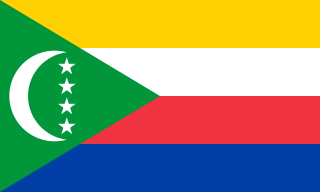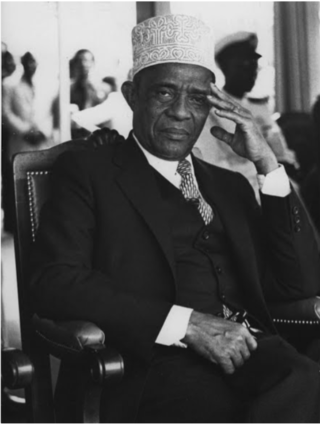 |
|---|
|
The Movement for Renewal and Democratic Action (French : Mouvement pour la Renovation et l'Action Democratique, MOURAD) was a political party in the Comoros.
 |
|---|
|
The Movement for Renewal and Democratic Action (French : Mouvement pour la Renovation et l'Action Democratique, MOURAD) was a political party in the Comoros.
The party was established in 1990. [1] It received 3.1% of the vote in the 1992 parliamentary elections, winning one seat in the Assembly of the Union. [2]

The Comoros, officially the Union of the Comoros, is an archipelagic country made up of three islands in Southeastern Africa, located at the northern end of the Mozambique Channel in the Indian Ocean. Its capital and largest city is Moroni. The religion of the majority of the population, and the official state religion, is Sunni Islam. Comoros proclaimed its independence from France on 6 July 1975. The Comoros is the only country of the Arab League which is entirely in the Southern Hemisphere. It is a member state of the African Union, the Organisation internationale de la Francophonie, the Organisation of Islamic Co-operation, and the Indian Ocean Commission. The country has three official languages: Shikomori, French and Arabic.
The history of the Comoros extends back to about 800–1000 AD when the archipelago was first inhabited. The Comoros have been inhabited by various groups and sultanates throughout this time. France colonised the islands in the 19th century, and they became independent in 1975.
Comorian is the name given to a group of four Bantu languages spoken in the Comoro Islands, an archipelago in the southwestern Indian Ocean between Mozambique and Madagascar. It is named as one of the official languages of the Union of the Comoros in the Comorian constitution. Shimaore, one of the languages, is spoken on the disputed island of Mayotte, a French department claimed by Comoros.

The Comoro Islands are a group of volcanic islands in the Mozambique Channel, an arm of the Indian Ocean lying between Madagascar and the African mainland. Three of the islands form the Union of the Comoros, a sovereign nation, while Mayotte belongs to France.

Ahmed Abdallah Abderemane was a top Comorian politician. He was a member of the French Senate from 1959 to 1973, and President of the Comoros from 25 October 1978 until his assassination in 1989.

Islam is the largest religion in the Comoros. According to the 2006 estimate by the U.S. Department of State, roughly 98% of the population in the Comoros is Muslim. Virtually all Muslims in the Comoros are Sunni belonging to Shafi'i school of jurisprudence. Most adherents are Arab-Swahili, but there are also people of Indian, largely Gujarati, descent.

Elections in the Comoros take place within the framework of a multi-party democracy and a presidential system. The President and the majority of the seats in the Assembly of the Union are directly elected.
Domoni is the second largest city on the Comorian island of Anjouan in the Indian Ocean and is located on the east coast of the island. It was the capital of the island in the past while the present capital of Anjouan is Mutsamudu.
The Comorian Union for Progress is a political party in the Comoros.

The following outline is provided as an overview of and topical guide to Comoros:
Polygamous marriages may be legally contracted in the nation of Comoros.

The predominant religion in the Comoros is Islam, with a small Christian minority. Although the constitution, as revised in 2018, removed the reference to a state religion in the 2009 constitution, stating simply that Sunni Islam is the source of national identity, a 2008 law promulgated in January 2013 outlawed the practice of other forms of Islam in the country. Propagation of non-Islamic religions is prohibited.

The official languages of the Comoros are Comorian, French and Arabic, as recognized under its 2001 constitution. Although each language holds equal recognition under the constitution, language use varies across Comorian society. Unofficial minority languages such as Malagasy and Swahili are also present on the island with limited usage. According to Harriet Joseph Ottenheimer, a professor of anthropology at Kansas State university, the linguistic diversity of the Comoros is the result of its rich history as part of the Indian maritime trade routes and its periods of Malagasy and French colonial rule.
Léon Joseph Henry Humblot was a French naturalist and botanical collector.

The Democratic Rally of the Comorian People was a political party in the Comoros.

The Comorian Democratic Union was a political party in the Comoros.

Maecha Bora was a political party in the Comoros.

Realising Freedom's Capability, also known as Uwezo (Leadership), was a political party in the Comoros.

The Rally for Change and Democracy was a political party in the Comoros led by Said Hassane Said Hachim.

Nguzo was a political party in the Comoros.